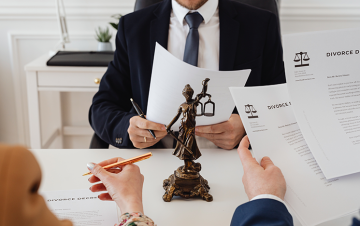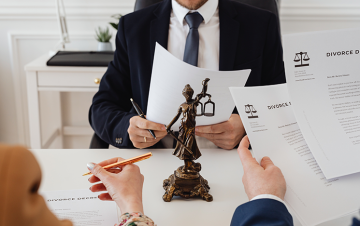Illegal seizure of a vehicle: legal support
"Illegal seizure of a vehicle" means the illegal theft or use of a vehicle without the owner's permission. This is a serious offense that can have serious legal consequences for the person who committed it. Such actions can be classified as theft or theft using a vehicle, depending on the specific circumstances.
A lawyer for illegal seizure of a vehicle (Article 289 of the Criminal Code of Ukraine) is an important specialist who can provide qualified assistance in cases where a person is accused of theft or illegal seizure of a car, motorcycle or other vehicles. This is a serious criminal offense that carries significant penalties, including imprisonment. In such cases, every detail is important: the evidentiary base, analysis of the circumstances of the crime and the choice of the optimal defense strategy. An experienced lawyer will help protect the rights of the accused, minimize the consequences of the case and preserve his reputation.
Legal stages in the case of illegal seizure of a vehicle
The main steps that a lawyer takes to effectively protect a client:
- Consultation of the client: The first thing a lawyer will do is to conduct a consultation with the client in order to understand all the circumstances of the case, find out the details and collect the necessary information about the car theft.
- Study of the case: The lawyer will conduct a detailed analysis of the case, study all the evidence and circumstances that are important for determining the defense strategy.
- Preparation of documents: The lawyer will prepare all necessary legal documents, including statements, reviews, requests for additional evidence, etc.
- Representation in court: The lawyer will represent the client's interests in court, presenting defense arguments, questioning witnesses, and negotiating with the prosecutor or other parties.
- Appeal and cassation: If the client is not satisfied with the court's decision, the lawyer can appeal to a higher court and, if necessary, even to the Supreme Court.
- Negotiating with the prosecution: A lawyer may try to reach an agreement with the prosecutor or another party in the case, which may include a reduced charge or a plea deal.
- Providing legal support during the investigation and interrogations: The lawyer can provide the client with legal support during the investigation, advise him on his rights and obligations, and also represent his interests during interrogations regarding the illegal possession of a vehicle.
- Other actions necessary to protect the client: Depending on the specific circumstances of the case, the lawyer may perform other actions, such as questioning witnesses, experts, etc.
Each stage is important for ensuring proper protection of the client's rights and is aimed at achieving a fair result in a specific situation.
Under what conditions can a lawyer's service for illegal seizure of a vehicle be provided?
Legal assistance can be provided only under certain conditions that ensure the possibility of effectively solving the client's problem:
- Presence of a legal problem: If a client has a specific legal problem or request for legal advice, a lawyer can provide a service.
- Abilitylawyer to solve the problem: The lawyer must have the necessary qualifications and experience in the relevant field of law to solve the client's problem.
- Availability of the client's ability to pay: If the client can pay for the lawyer's services or if the service is provided free of charge (for example, through free legal aid).
- Absence of a conflict of interest: A lawyer must not have a conflict of interest that could prevent the provision of objective and effective legal assistance.
Only under such conditions can a lawyer work effectively and provide a service that will meet the client's needs and allow resolving the issue in accordance with the requirements of the law.
Under what conditions can a lawyer's service for illegal seizure of a vehicle not be provided?

Conflict of interest: If there is a conflict of interest, for example, if the client and lawyer have conflicting interests in the case, or if the lawyer has a pre-existing obligation to another client in the case.

Insufficient payment capacity of the client: If the client cannot pay for the lawyer's services, but there is no reason to provide free legal aid, the lawyer may refuse to provide the service.

Inadequate service: If the client's problem does not require legal intervention or does not fall under legal competence, the lawyer may refuse to provide the service.
How to deal with issues of illegal seizure of a vehicle on your own?
For persons who wish to independently understand the case, it is important to know the key steps:
- Research the legislation: Start by researching the relevant legislation that applies to your situation. You can find the text of the law or code online or at your local library.
- Get the facts: Make a list of all the facts related to your situation. This can include dates, events, names of people involved, etc. Consider similar court decisions: Search for court decisions or precedents that deal with similar cases. This can help you understand which arguments might be effective in your situation.
- Consult with resources: If you have the opportunity, consult with reliable sources, such as a lawyer or legal aid organization.
- They can help you understand your rights and options. Feel free to ask: If you have any questions or concerns, feel free to ask. You can turn to specialists in your area or even to human rights organizations.
- Gather evidence: If you have evidence to support your position, preserve it. This may include written documents, photographs, witness statements, etc. Consider all your options: After you have all the information you need, carefully consider all your options and weigh their pros and cons.
- Act with understanding: After you have thoroughly analyzed the situation and considered all possible options, make an informed decision about the next course of action.
Independently analyzing a legal situation can be a difficult task, however, by correctly using available resources and advice, you can achieve an understanding of your rights and opportunities. It is important to remember that in case of complex issues it is better to contact a qualified lawyer in order to avoid mistakes that may negatively affect the outcome of the case.
Common questions about illegal seizure of a vehicle
Question
What actions are considered illegal possession of a vehicle?
Answer
Actions that are considered illegal possession of a vehicle: Theft of a car without the owner's permission. Using the car without the owner's permission or without the right to use it. Sale, transfer or other disposal of a stolen car.
Question
What are the consequences of illegal possession of a vehicle?
Answer
Consequences of illegal possession of a vehicle: Criminal liability before the law, which may include imprisonment, fines or restriction of liberty. Loss of trust and reputation. Damage to the owner of the vehicle and other parties.
Question
What rights does the owner of the vehicle have if it is stolen?
Answer
Rights of the owner in case of vehicle theft: The right to notify law enforcement agencies of abduction. The right to compensation for damages or insurance.
What does the cost of a lawyer's services under Article 289 of the CCU depend on?
The price may depend on several factors. First, the complexity of the case, in particular, the presence or absence of evidence, the number of witnesses or participants in the process, can affect the tariff. Second, the lawyer's qualifications and experience in this area also matter - experienced specialists can set a higher price for their services. The third factor is the location of the case, since in large cities legal services can be more expensive due to higher office maintenance costs and other operating expenses.
ConclusionLegal assistance in cases of illegal seizure of a vehicle is an important stage in protecting the client's rights and interests. Each step, from consultation to representation in court, is aimed at effectively resolving the situation in accordance with the requirements of the law. However, it is important that the client has the opportunity to use professional assistance that will ensure the correct interpretation and application of the rules of law in a specific case. In the event of complex legal issues or uncertainty about rights and obligations, one should always contact experienced lawyers who can provide the necessary legal support and ensure effective protection.








































